必修4 Module 1 Life in the Future语言点
文档属性
| 名称 | 必修4 Module 1 Life in the Future语言点 | 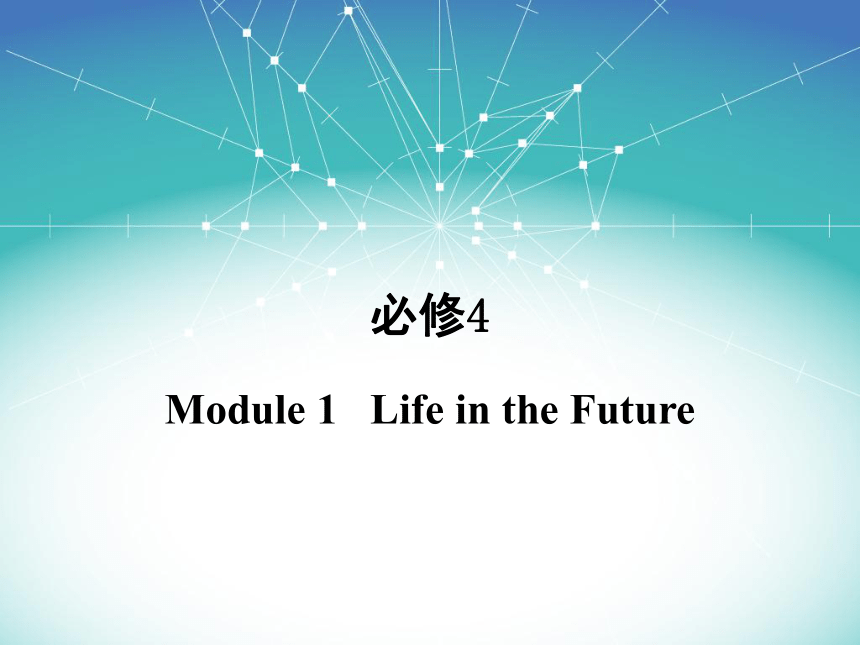 | |
| 格式 | zip | ||
| 文件大小 | 464.9KB | ||
| 资源类型 | 教案 | ||
| 版本资源 | 外研版 | ||
| 科目 | 英语 | ||
| 更新时间 | 2012-05-25 13:18:17 | ||
图片预览

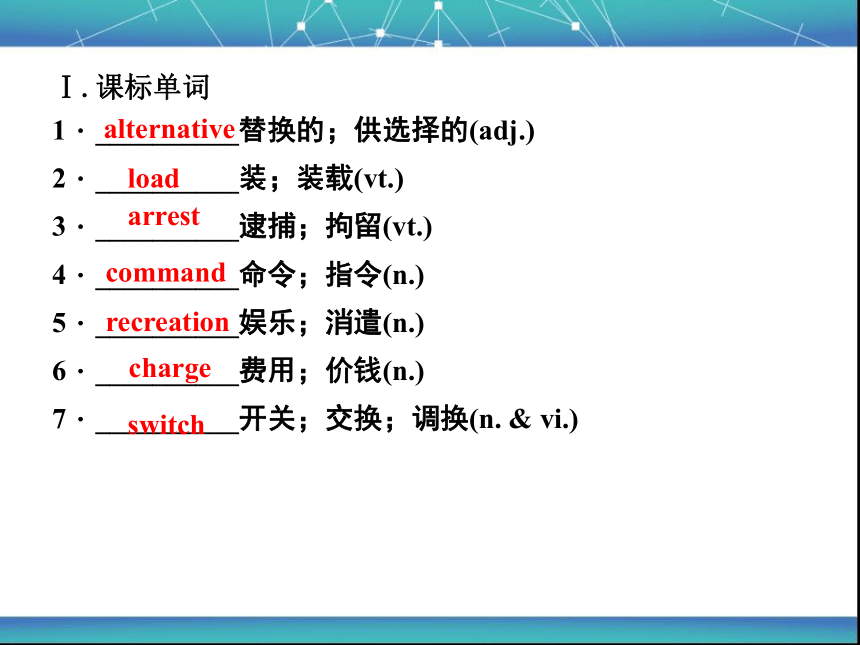

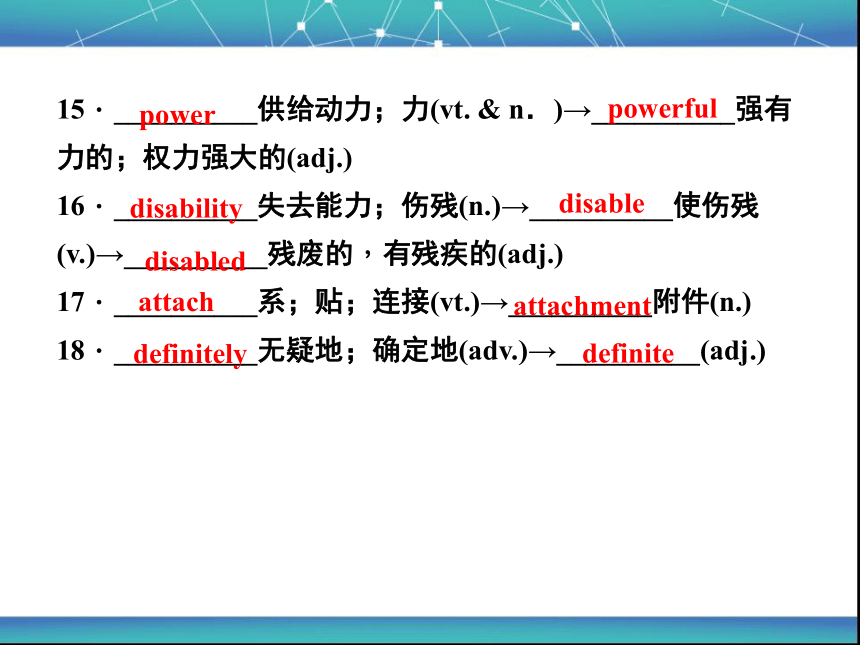
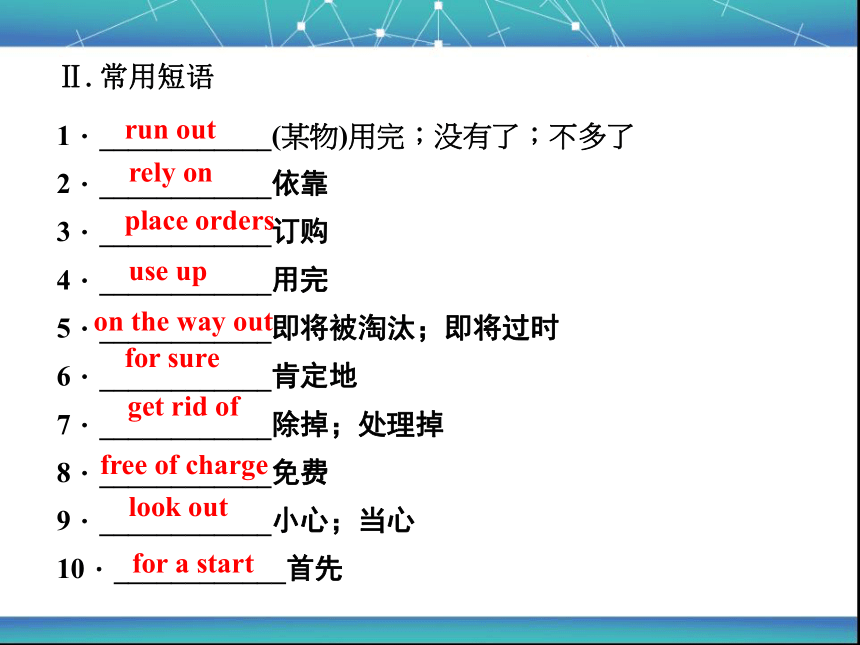
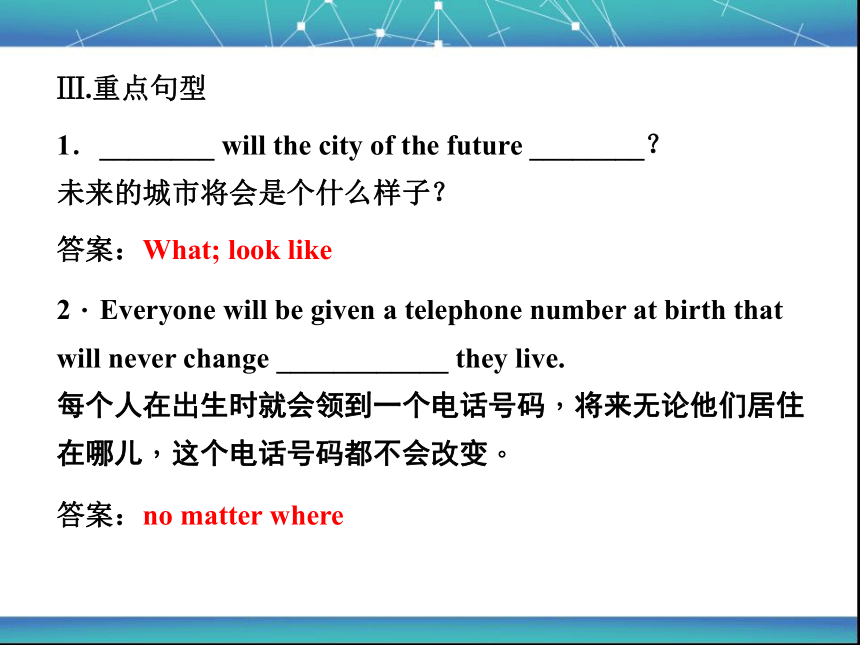
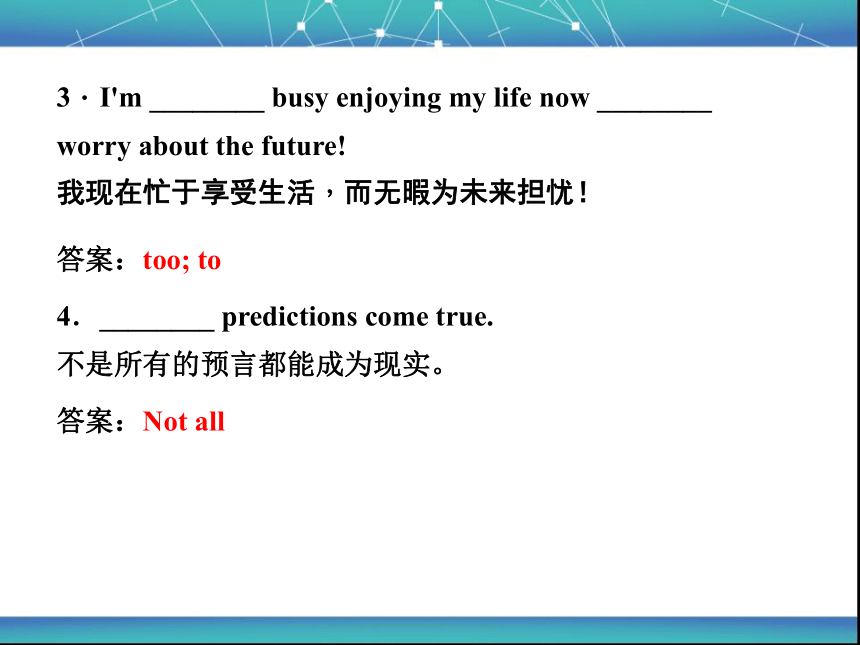
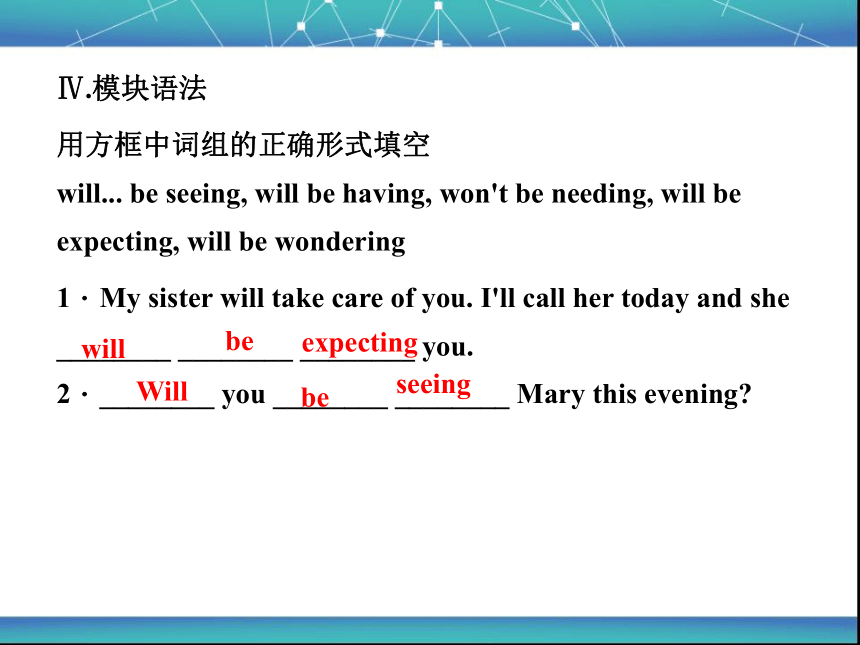

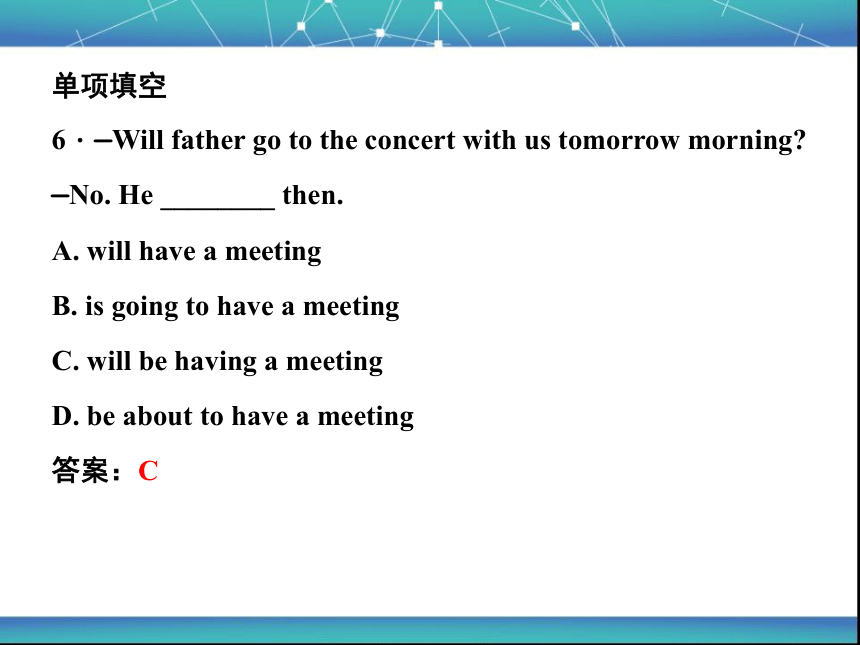
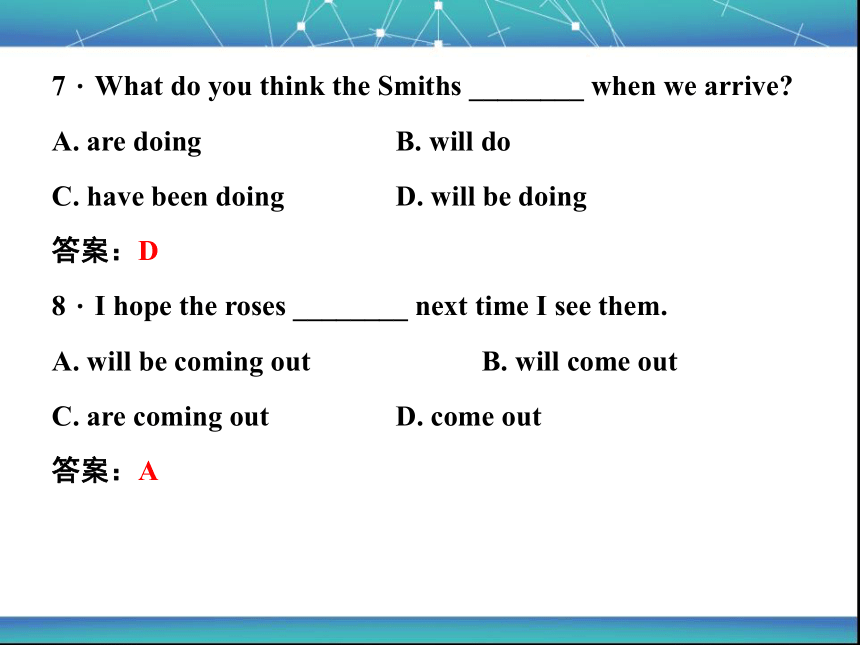
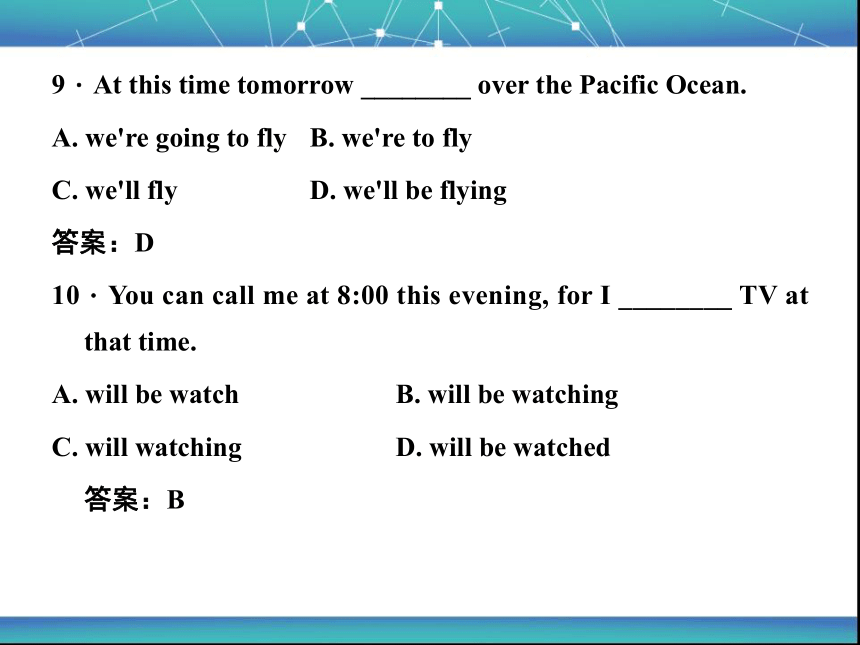
文档简介
(共136张PPT)
必修4
Module 1 Life in the Future
Ⅰ.课标单词
1.__________替换的;供选择的(adj.)
2.__________装;装载(vt.)
3.__________逮捕;拘留(vt.)
4.__________命令;指令(n.)
5.__________娱乐;消遣(n.)
6.__________费用;价钱(n.)
7.__________开关;交换;调换(n. & vi.)
alternative
load
arrest
command
recreation
charge
switch
8.__________乐观的;乐观主义的(adj.)
9.__________最后;终于(adv.)
10.__________造成……形状(vt.)
11.__________预测(n.)→__________预言;预料(vt.)
12.__________危险的;冒险的(adj.)→__________危险;冒险(n. & v.)
13.__________依赖;依靠(vi.)→__________可依赖的;可依靠的(adj.)
14.__________罪犯;犯人(n.)→__________罪;罪行(n.)
optimistic
eventually
shape
prediction
predict
risky
risk
rely
reliable
criminal
crime
15.__________供给动力;力(vt. & n.)→__________强有力的;权力强大的(adj.)
16.__________失去能力;伤残(n.)→__________使伤残(v.)→__________残废的,有残疾的(adj.)
17.__________系;贴;连接(vt.)→__________附件(n.)
18.__________无疑地;确定地(adv.)→__________(adj.)
power
powerful
disability
disable
disabled
attach
attachment
definitely
definite
Ⅱ.常用短语
1.____________(某物)用完;没有了;不多了
2.____________依靠
3.____________订购
4.____________用完
5.____________即将被淘汰;即将过时
6.____________肯定地
7.____________除掉;处理掉
8.____________免费
9.____________小心;当心
10.____________首先
run out
rely on
place orders
use up
on the way out
for sure
get rid of
free of charge
look out
for a start
Ⅲ.重点句型
1.________ will the city of the future ________? 未来的城市将会是个什么样子?
答案:What; look like
2.Everyone will be given a telephone number at birth that will never change ____________ they live.
每个人在出生时就会领到一个电话号码,将来无论他们居住在哪儿,这个电话号码都不会改变。
答案:no matter where
3.I'm ________ busy enjoying my life now ________ worry about the future!
我现在忙于享受生活,而无暇为未来担忧!
答案:too; to
4.________ predictions come true. 不是所有的预言都能成为现实。
答案:Not all
Ⅳ.模块语法
用方框中词组的正确形式填空 will... be seeing, will be having, won't be needing, will be expecting, will be wondering
1.My sister will take care of you. I'll call her today and she ________ ________ ________ you. 2.________ you ________ ________ Mary this evening
will
be
expecting
Will
be
seeing
3.You'd better borrow my bike. I ________ ________ ________ it.
4.Please come tomorrow afternoon. Tomorrow morning I ________ ________ a meeting.
5.If you don't write, they ________ ________ ________ what has happened to you.
won't
be
needing
will
be having
will
be
wondering
单项填空
6.—Will father go to the concert with us tomorrow morning
—No. He ________ then.
A. will have a meeting
B. is going to have a meeting
C. will be having a meeting
D. be about to have a meeting
答案:C
7.What do you think the Smiths ________ when we arrive
A. are doing B. will do
C. have been doing D. will be doing
答案:D
8.I hope the roses ________ next time I see them.
A. will be coming out B. will come out
C. are coming out D. come out
答案:A
9.At this time tomorrow ________ over the Pacific Ocean.
A. we're going to fly B. we're to fly
C. we'll fly D. we'll be flying
答案:D
10.You can call me at 8:00 this evening, for I ________ TV at that time.
A. will be watch B. will be watching
C. will watching D. will be watched
答案:B
考 点 解 读
1.rely vi.依靠,依赖
Nowadays we rely increasingly on computers for help/to help us.
①reliable adj.可信赖的,可靠的;确实的
②reliability n.可靠(性),可信(性)
③rely on/upon = depend on 依赖,信任
④rely on/upon sb./sth. to do相信(依赖)某人(某物)去做……
⑤rely on it that...指望……
注意:depend on, count on, figure on也都可表示“依赖,依靠”,其用法与rely on类似,但表示“取决于”时,则常用depend on。
误区警示:rely on不用于进行式;且接that从句时,需用it代替即:rely on it that...。
朗文在线:
①I think we can rely on Derek not to tell anyone.
我认为我们可以信赖德里克,他不会告诉任何人。
②You can't just rely on your parents lending you the money.你不能只指望父母借钱给你。
③They have to rely on the river for their water.
他们用水只能依靠这条河。
命题方向:rely on常与take on,keep on等以词义辨析的形式出现。
活学巧练:翻译句子
(1)We rely on our own efforts.
____________________________
(2)She may forget—she's not very reliable.
____________________________
答案:(1)我们依靠自己的努力。
(2)她可能忘了。她并不是非常可靠的。
(3)Children should not be encouraged to ________ the electronic dictionaries as it will make them lazier.
A. insist on B. rely on
C. keep on D. work on
答案与解析:B 句意:不应该鼓励学生依赖电子词典,因为这会使学生变得更懒。rely on“依赖,依靠”;insist on“坚持”。keep on“继续”;work on“继续工作,从事于”。
3.power n. 能力,力量,动力,权力;vt. 使……有力量,供以动力
①Power should be used wisely.
应明智地运用权力。
②Knowledge is power.
知识就是力量。
知识拓展
powerful adj. 强大的,强有力的
in power 当权的,在朝的
in one's power 为某人力所能及
out of/beyond one's power 不胜任,力所不及
come to/into power (开始)掌权,上台
take power 取得政权
辨析:power, force, strength
都含有“力”,“力量”的意思。
1)power指身体上、精神上或心理上的力量,不管是表现出来的还是潜在的。
It's beyond_his_power.
这是他力所不及的。
2)force指运用或发挥出来的力量,可以克服阻力,使人或物按要求的方向运动。
He did it with great force.
他用了很大的力才把它做完了。
3)strength指内部固有的力量,表示物质力量时,着重体格或构造健全、完善等方面的力量(如体力强度等);表示精神力量时,指持久、坚定、无畏、坚韧等。
He has the strength_to lift the box.
他有力气举起这个箱子。
即学即用
汉译英
他失去了说话的能力。
__________________________________
答案:He lost his power of speech.
2.alternative n.(二者当中)选一个;供选择的东西
adj.(二者当中)选其一的;可供代替的
精讲拓展:
①
②the alternative of going or staying去留之间的抉择
③alternative ways可供选择的方法
④alternatively adv.两者挑一地
⑤alternate v.交替;轮流
⑥alternate...and/with使交替发生或出现;轮流安排
误区警示:alternative一词既可作形容词,也可作名词使用。
朗文在线:
①There doesn't seem to be an alternative option.
似乎没有另一个选择。
②Check out the alternatives before deciding whether to go to a nearby college.
在决定是否去一所附近的大学以前,最好查一下有没有其他可以选择的学校。
词语辨析: alternative,choice与preference
①alternative“取舍,抉择”,一般指从两个中选择一个,只限于办法,打算等,而不能指具体事物。
②choice“选择”,常用词,强调自由地选择,不论选择方式及选择对象的多少。
③preference“选择”“偏爱”,强调按照自己的喜爱选择。
命题方向:alternative常与choice,preference等以词语辨析的形式出现。
活学巧练:
I offered the __________ suggestions of spending the holiday in the mountains or by the sea.
A.alternative B.reasonable
C.practical D.sensible
答案与解析:A 解答此题的关键是“or”,“不是去山上就是去海边”,所以最佳答案是A项。B项“有道理的”;C项“切合实际的”;D项“有判断力的”。
即境活用
2.(2009年高考湖北卷)As there is less and less coal and oil,scientists are exploring new ways of making use of________energy,such as sunlight,wind and water for power and fuel.
A.primary B.alternative
C.instant D.unique
解析:选B。句意是:由于煤和石油越来越少,科学家正在开发新的利用可替代能源的方法,比如利用阳光、风和水来发电和做燃料。根据句意可知此处要用alternative表示“可替代的”。primary主要的;instant立即的;unique独特的。
★3.(南京市2010届高三上学期期末)The new airport is built close to the freeway,and it is________by Bus No.2.
A.accessible B.available
C.alternative D.abundant
解析:选A。考查形容词辨析。句意“新机场建的离高速公路很近,并且乘二路公共汽车可以到达。”accessible“能接近的;可进入的”;available“有空的,有用的”;alternative“可替代的”;abundant“大量的;丰富的”。
归纳总结
3.charge vt. 收费,要价;控告;给……充电 n. 费用;指责;控告;责任
(回归课本P2)All forms of recreation,such as cinemas,bowling,softball,concerts and others,will be provided free of charge by the city.所有的娱乐形式,如电影院、保龄球、垒球、音乐会和其他的都由该市政府免费提供。
误区警示:注意in charge of与in the charge of的区别,in charge of是“管理”,而 in the charge of是“受……的管理”。
活学巧练:
—I have just had my watch repaired.
—How much did they ________ for that
A.cost B.charge C.spend D.consider
答案与解析:B charge money for sth. 向……要价多少。
朗文在线:
①Gas charges will rise in July.
7月份煤气价格将上涨。
②Who's in charge around here
这儿谁负责?
③We won't charge for delivery if you pay now.
如果现在付款,我们将免费送货上门。
命题方向:charge常与cost, spend, expense等以词义辨析的形式出现。
即境活用
5.(2010年湖北黄冈中学模拟)Urban crowdedness would be greatly relieved if fares________on public transport were more reasonable.
A.offered B.spent
C.paid D.charged
解析:选D。动词辨析。charged on public transport是过去分词短语做后置定语。句意是:针对公共交通收取的费用合理就能缓解城区的拥堵。
★6.One thousand dollars a month is not a fortune but would help cover my living________.
A.bills B.expenses
C.prices D.charges
解析:选B。句意为“一个月1,000美元不是一笔财富,但是能帮助我支付我的生活费用”。A项意为“账单”;B项意为“花费,费用”,指的是各种可能的“开支,消费,收费”;C项意为“价格”;D项意为“索价,要价”。根据句意答案应选B。
4.attach v.系;贴;连接;把……固定;使附属;重视
精讲拓展:
①attach...to...把……固定到……,把……附在……
②attach oneself to参加;和……在一起
③attach one's name to在……上签名
④attach to sb./sth.与……有联系,与……有关联
⑤be attached to依恋,爱慕,附属于
⑥attach importance/ value... to sth.认为……重要/有价值
误区警示:attach构成的短语中to为介词,后应接名词或动名词。
朗文在线:
①Attach a recent photograph to your application form.
申请表上请贴一张近照。
②It's easy to become attached to the children you work with. Too attached, sometimes.
很容易喜欢上和你相处的孩子们,有时候会喜欢过头。
③It's easy to let the emotions attached to one situation spill over into others.
一件事中产生的情绪很容易蔓延到其他事情上。
命题方向:attach...to...短语是重要的考点。
活学巧练:
Nowhere can I find the labels __________ the luggage which was put on the desk.
A.attached to B.attaching to
C.stuck in D.sticking to
答案与解析:A attach sth. to sth.“把……系到……”,所以attach与labels是动宾的关系,所以用-ed形式作宾补,假如把C项中的in改为to,C项也是正确的。
即境活用
★3.Dr. Carlos was ________to painting,so he was determined to take it up after he retired.
A.attached B.devoted
C.absorbed D.related
解析:选A。be attached to sth.“依恋,爱恋”。
4.(2010年高考江西卷)Parents________much importance to education.They will do their best to give their children that priceless gift.
A.attach B.pay
C.link D.apply
解析:选A。句意:父母认为教育很重要。他们会尽全力给他们的孩子那份无价的礼物。本题考查动词短语搭配。attach much importance to...认为……很重要;link...to...把……与……联系起来;apply...to运用,应用
5.shape n.形状;外形;样子;情况,状况vt.塑造,形成;发育,发展
His attitudes were shaped partly by his early experiences.
①in shape处于良好状态,健康
②in the shape/form of以……的形式
③out of shape状况不佳;变形
④give shape to清晰地表达……
⑤take shape成形;变得更有条理
⑥get... into shape(为健美而)进行锻炼
⑦shape...into...做成(某事);塑造成(某形状)
⑧shape up发展
活学巧练:
(2010·广东深圳中学)—That's me when I got married.See what I look like now!
—Why not go on a diet to get into __________?
A.shape B.form
C.appearance D.body
答案与解析:A get into shape“获得好身材”,为固定短语。
特别提示:
shape,form和figure都含有“形状”“形态”的意思但侧重点不一样。shape指“外形,形状”;form指“形式”;figure指“外形,轮廓”。
命题方向:shape往往与form作辨析,动词用法也应注意。
4. command n. 命令;指令;掌握;司令部
vt.& vi. 命令,指挥控制,支配;博得;俯瞰
(回归课本P2)In the future all shopping will be done online,and catalogues will have voice commands to place orders.
将来所有的购物将会在网上进行,商品目录将会有语音指令来排序。
归纳总结
例句探源
①The army is under the king’s command.
军队由国王直接统率。
②The general commanded his men to attack the city.
将军下令他的部下攻城。
③My boss commanded that I (should) get there at once.
老板命令我立即去那里。
④The fire officer took command,ordering everyone to leave the building.
消防员开始指挥大家离开大楼。
即境活用
7.If you have a good________of English,you’ll get a well paid job very easily.
A.control B.improvement
C.command D.demand
解析:选C。句意:如果你精通英语,就会很容易地找到一份高薪工作。此处用have a good command of表示“精通”。control控制;improvement改善;demand需要,均不符合题意。
5 for sure 肯定地,确实
(回归课本P2)No one knows for sure,and making predictions is a risky business.
没有人确切地了解,预测也是一件很冒险的事。
★8.Captain Cook commanded that all the goods________into the sea.
A.should throw B.be thrown
C.threw D.should thrown
解析:选B。command后跟宾语从句应用虚拟语气,再根据goods和throw之间应是被动关系,should又可省略,所以选be thrown。
归纳总结
例句探源
①He will be here for sure within an hour.
他一小时之内肯定能到这儿。
②(牛津P2032)Make sure (that) no one finds out about this.
绝对不要让任何人发觉这件事。
③You can be sure of one thing—there’ll be a lot of laughs.
你有一点可以肯定——将会笑声不断。
④Be sure to ring and let us know you’ve got back safely.
一定要来个电话,让我们知道你已经平安返回。
即境活用
9.Many of the students are________that they will pass the college entrance examination.
A.surely B.sure
C.able D.certainly
解析:选B。be sure that...“对……有把握”。
★10.It is________that he will come on time.
A.certainly B.surely
C.certain D.sure
解析:选C。sure的主语一般是表示“人”的词,而certain 的主语既可以是“人”,也可以是“物”。
6 run out 用光,耗尽;暂时离开
(回归课本P2)In the future,care for the environment will become very important as earth’s natural resources run out.
将来,爱护环境将会很重要,因为地球的资源将濒临枯竭。
归纳总结
例句探源
①He is always running out of money before payday.
他老是发工资的日子还没到就把钱花完了。
②We shall run out of town for the weekend.
我们将暂时离开城里去度周末。
③We are running out of our supplies soon.
我们的供给很快就耗尽了。
易混辨析
run out(of),give out,use up
这三个短语都有“用光,用尽”的含义。
(1)run out是不及物动词短语,后面不能跟宾语,run out of是及物动词短语,其后可以跟宾语。
(2)give out含有“耗尽,筋疲力尽”之意,是不及物动词短语。
(3)use up意为“用完,耗尽”,是及物动词短语,常用人作主语。
命题方向:run out常与run out of,use up以辨析的形式出现。
①Could I have a cigarette?I seem to have run out of them.
②Scientists predict that the world’s oil supply will soon give out/run out.
③He has used up all his energy.
活学巧练:介/副词填空
(1) Her dog was running ________ a rabbit.
(2)Toby ran away ________ home at the age of 14.
(3)Their daughter was run ________ by a car just outside their house.
(4)Guess who I ran ________ in town today!
(5)I have run ________ ________ my money, so I can't buy this book.
after
from
over
across
out
of
即境活用
★11.—I’m still working on my project.
—Oh,you’ll miss the deadline.Time is________.
A.running out
B.going out
C.giving out
D.losing out
解析:选A。run out(时间、金钱等的)耗尽;give out意为“精疲力竭”,由句意可知A项正确。
句型巧析
1【教材原句】 I’m too busy enjoying my life now to worry about the future!(P8)
我现在忙于享受生活而无暇担忧未来。
【句法分析】 (1)too...to do sth.“太……而不能做某事”是一个表示否定意义的句型。
(2)某些形容词与too...to...句型连用时,too(=very)表示肯定的意义。这些形容词多为表示情感的词,如glad,pleased,surprised,delighted,happy,easy,willing,ready,eager,anxious等。
12.(2010年江苏南通第三次模拟)Men will________all the natural resources if they continue consuming them like that.
A.run out B.wipe out
C.drop out D.hold out
解析:选B。动词短语wipe out“消除;清除”。run out是不及物动词短语,这里有宾语all the natural resources,故不能使用。
(3)如在too前加上only,but,all,simply或just时,“too...to”结构表示肯定意义,此时too带有赞赏的感彩。
(4)“too...to...”结构和never,not等否定副词连用时,表示肯定意义,意为“无论……也不过分,越……越好”。
①You are too young to understand such things.
你太年轻了,不懂得这些事情。
②The problem is too difficult for me to work out.
这道题太难了,我做不出。
③He is too willing to follow others’ advice.
他极愿意接受别人的意见。
④She will be only too pleased to help you.
她会很乐意帮助你的。
⑤It’s never too late to learn.
活到老,学到老。
即境活用
13.完成句子
①They reached the railway station ________________the train.
他们到火车站太晚了,没赶上火车。
答案:too late to catch
②He was ________________the result of his examination.他急于想知道考试的结果。
答案:too anxious to know
2 【教材原句】 Everyone will be given a telephone number at birth that will never change no matter where they live.(P2)
每个人在出生时都会领到一个电话号码,无论他们生活在什么地方,这个号码都不会改变。
【句法分析】 (1)“no matter+疑问词...”引导让步状语从句,意为“不管,无论……”,可与“疑问词 ever”引导的让步状语从句互换。
①No matter how hard he tried,he couldn’t get her to change her mind.
不管他怎样努力,也没能使她改变主意。
②My parents always waited up for me,no matter what time I got home.
无论我什么时候回家,父母总是(不去睡觉)等着我。
(2)where/when/how+ ever 只引导让步状语从句,所以完全等同于no matter+where/when/how,而who/whom/what/which+ ever除引导让步状语从句外还可引导名词性从句。引导名词性从句时,who/whom/what/which+ ever不能转换为no matter+who/whom/what/which。这时的whatever意为“所有的一切人和事”,相当于anything that;whoever意为“任何……的人”,相当于anyone who;whichever意为“……的那个人或事物”,相当于the person or the thing that。
③No matter what(whatever)happened,he would not mind.
无论发生什么,他都不会介意。
④No matter where (wherever) you go,you will find many kind people who want to help others.
无论你去哪儿,你都会发现有很多乐意帮助别人的好心人。
⑤Whoever wants to visit the museum,he must ask our teacher for permission.
无论谁想去参观博物馆,都需经我们老师同意。(此句中whoever可改为no matter who。)
⑥Whoever wants to visit the museum must ask our teacher for permission.(此句中whoever引导主语从句,不可用no matter who替换。)
即境活用
14.________hungry I am,I never seem to be able to finish off this loaf of bread.
A.Whatever B.Whenever
C.Wherever D.However
解析:选D。句意:无论我多饿,看来我都吃不了那大片面包。A项无论什么事,常与名词连用或引导名词性从句;B项无论什么时候;C项无论在哪;D项无论多么或怎样,常与形容词或副词连用,故选D。
★15.________well prepared you are,you still need a lot of luck in mountain climbing.
A.However B.Whatever
C.No matter D.Although
解析:选A。句意:无论你做的准备多么充分,在爬山时,你仍会需要很多运气。however well prepared you are=no matter how well prepared you are,引导让步状语从句。
活学巧练:
Doctor Godwin says that __________ what forceful arguments against cigarette harm there are,many people insist on smoking.
A.though B.however
C.no matter D.even if
答案与解析:C no matter what...“无论什么”,引导让步状语从句。句意:Godwin医生说,无论讨论多么有力地证明吸烟有害,许多人还是要吸烟。
9.Not all predictions come true.
不是所有的预言都能变为现实。
部分否定与全部否定的惯用语对照如下:
两
者 部分否定 全部否定
both...not/not...both
(并非两者都) neither/nor...either
(两者都不)
Both of the sisters are not here.
并非两姊妹都在这里。 Neither of the sisters is here.
两姊妹都不在这里。
两
者
以
上 all...not/not...all
(=some)
(并非所有……都)
every...not/not...every
(=some,few)
(并非每一个……都)
the whole...not/not...
the whole(并非全部) not...any/none
(没有一个)
no one/nobody(没有人)
nothing(没有任何事物)
I don't know all of them.
他们我不全认识。 I don't know any of them.
他们我全不认识。
副
词 部分否定 全部否定
not everywhere(并非到处)
not absolutely(并非绝对)
not altogether(并不全为)
not always(未必 总是)
not completely(并非完全)
not entirely(并非全都)
not exactly(不全是,未必就)
not generally(一般并不)
not necessarily(未必)
not quite(并不十分)
not wholly(未必) Nowhere
(没有任何地方)
not(不,没有)
not at all/not a bit
(一点也不)
never(从来不)
The fault is not altogether mine.
错不全在我。 The fault is not at all
mine.
错绝对不在我。
10.将来进行时
将来进行时由助动词will/shall be+现在分词构成。will be 用于各类,shall be用于第一人称。
(1)将来进行时的用法
①表示将来某一段时间或某时刻正在进行的动作。
This time tomorrow I shall be flying to New York.
明天这个时候我将飞往纽约。
When you come, we shall be having an English lesson.
你来的时候,我们将正在上英语课。
Don't call me up at ten o'clock in the evening; I shall be sleeping then.
不要在晚上10点钟打电话来,那时我正在睡觉。
②表示说话人感到某事即将发生或按计划预计要发生。
We shall be holding a League meeting tonight.
我们今晚要开团员会。
I shall be taking the driving test next week.
下周我将参加驾驶考试。
What time will he be arriving at the airport
他预计几点钟到达机场?
(2)将来进行时和一般将来时的区别
两者都表示将来的行为,但将来进行时表示主观上感觉某事即将发生而不表示个人意愿,往往有表示将来某时间的状语;一般将来时单纯表示将来;am/is/are going to多用在口语中,常表示个人意愿或某事不可避免即将发生。
Mr. Li will be teaching us Chinese next term.
下学期李先生将教我们中文。(说话人感觉此事将发生)
Mr. Li will teach us Chinese next term.
下学期李先生将教我们中文。(单纯表示将来)
考 题 演 练
1.Could I speak to ________ is in charge of International Sales please
A. who B. what
C. whoever D. whatever
答案与解析:C 本题考查宾语从句。要熟练运用宾语从句的引导词。句意:请问一下我能不能和负责国际贸易的人说话?speak to后接sb.故排除B、D。句中to后跟宾语从句,而且从句中又缺少主语,并且是不确指,故排除A项。
2.John is very ________ —if he promises to do something he'll do it.
A. independent B. confident
C. reliable D. flexible
答案与解析:C 本题考查形容词意义辨析。句意:约翰非常可靠,他答应的事情就一定会做到。independent独立的;confident有信心的;reliable可靠的;flexible灵活的。
3.Daniel's family ________ their holiday in Huangshan this time next week.
A. are enjoying B. are to enjoy
C. will enjoy D. will be enjoying
答案与解析:D 本题考查时态。看清并找准上下句的时间状语和上下句之间的关系,是做此类题的关键。句意:下周的这个时候,丹尼尔一家将在黄山度假了。由时间状语next week可知,事情发生在下周,故用将来时态,又因this time指这个时候正在做的事,故用一般将来进行时态。
4.As there is less and less coal and oil, scientists are exploring new ways of making use of ________ energy, such as sunlight, wind and water for power and fuel.
A. primary
B. alternative
C. instant
D. unique
答案与解析:B 本题考查形容词词义辨析。解答此类题的关键是弄明白所给形容词的正确含义。primary初等的;最初的;alternative可供替代的;可选择的;instant立即的;即刻的;unique独一无二的。由常识可知,阳光、风力及水力都是可替代能源,故B项正确。explore new ways of doing sth.探索做……的新方法。
5.The how-to book can be of help to ________ wants to do the job.
A. who B. whomever
C. no matter who D. whoever
答案与解析:D 本题考查名词性从句的连接词。注意分析从句的句式结构及句意。此处介词to后缺少宾语从句,而宾语从句又缺少主语,应用whoever,相当于anyone who,意为“无论谁”。C项只引导让步状语从句。
6.When you've finished with that book, don't forget to put it back on the shelf, ________?
A. do you B. don't you
C. will you D. won't you
答案与解析:C 本题考查祈使句反意疑问句的用法。句意:当你读完了那本书,别忘了把它放回书架上,好吗?当祈使句的逻辑主语是you时,其反意疑问句应用will you?或won't you?但当祈使句是否定式时,其反意疑问句只有will you
7.Lucy's new job paid twice as much as she had made ________ in the restaurant.
A. working B. work
C. to work D. worked
答案与解析:A 考查v.-ing的用法。句意:露西新工作的报酬是她在饭店工作时的两倍。从句主语“she”与动词“work”之间表主动,故用v.-ing形式,作时间状语,相当于when she worked。
8.—I'm still working on my project.
—Oh, you'll miss the deadline. Time is ________.
A. running out B. going out
C. giving out D. losing out
答案与解析:A 本题考查动词短语的意义辨析。run out(时间、金钱等的)耗尽;give out意为“精疲力竭”,由句意可知A项正确。
9.________ hungry I am, I never seem to be able to finish off this loaf of bread.
A. Whatever B. Whenever
C. Wherever D. However
答案与解析:D 考查让步状语从句。句意:无论我是多么饥饿,我似乎永远都不能吃完这个面包。A项“无论什么”;B项“无论在什么时候”;C项“无论在哪里”;D项“无论多么”。
Module 1 Life in the Future
Ⅰ.根据句意,用所给单词的适当形式填空
predict switch disable outdoors optimistic alternative urban recreation attach resources
1.It's dark, so you shouldn't ________ off the lights in the classroom.
答案:switch
2.It is raining heavily outside and the children can't play games ________.
答案:outdoors
3.Her job is to ________ labels to the luggage of the passengers at the station.
答案:attach
4.We should value and make better use of our natural ________.
答案:resources
5.Skating and skiing are two ________ activities favored by children who live in cold and hilly areas.
答案:recreational
6.You have the ________ choices of telling us the truth or remaining silent.
答案:alternative
7.An expert's ________ shows that the atmosphere will be 3℃ warmer in 2005 if people continue to burn fuels.
答案: prediction
8.A student with learning ________may not be able to understand the teacher very well.
答案:disability
9.More and more people are tired of ________ life today and come to live in the countryside.
答案:urban
10.Doctors are not very ________ about the result of the surgery. Another surgery will be needed.
答案:optimistic
Ⅱ.单项填空
1.An important meeting is __________, so you'd better not go into the meeting room.
A.on the way B.in progress
C.in the way D.in advance
答案与解析:B A选项意思是“在路上”;B选项意思是“在进行中”;C选项意思是“挡路”;D选项意思是“预先”。所以只有B项符合题意。
2.No matter __________ difficulty we will meet, we will keep on doing the experiment until we succeed.
A.what B.how
C.where D.which
答案与解析:A 此题干中的difficulty是名词,所以要用what修饰。
3.My sister insisted that she __________ the youngest of the family and __________ traveling with their parents.
A.should be; should go B.be; go
C.be; would go D.was; go
答案与解析:D 第一个从句是坚持一个事实,用陈述语气;第二个从句是坚持应该做某事,用虚拟语气。
4.I hope your dream of becoming a writer will __________ in the future.
I've long been looking forward to meeting your father, and I have no idea when this dream can ________.
A.come true B.come truly
C.come to truth D.be come true
答案与解析:A 本题考查动词短语come true的用法。come true是固定短语,意为“(希望,理想等)实现,达到”,相当于be realized,其中come为连系动词,不能用于被动语态。
5.The train __________ at 6:00 p.m.. So I have to be at the station __________ 5:40 at the latest.
A.will leave; until B.leaves; by
C.is going to leave; at D.is leaving; after
答案与解析:B 时间表里的动作用一般现在时表将来;by意为“在……之前”。
6.Many of the students are __________ that they will pass the entrance examination.
A.surely B.certainly
C.certain D.able
答案与解析:C 本题考查be certain+that从句。
7.—Tony, look at the water on the floor! you forget to turn off the tap.
—________! I just received a phone call. I'll do the cleaning up.
A.My pleasure B.Not really
C.Never mind D.My God
答案与解析:D 考查日常交际用语。My God! 表示惊讶,恼怒或开心;My pleasure! 不客气,不用谢,用于别人感谢时表示很乐意做某事的答语;Not really! 不是,(尤指)不会是;Never mind! 用于别人向你表示歉意时的答语,表示不要紧,没关系。
7.John was doing a lot of physical exercise to build up his ________.
A.ability B.force
C.strength D.mind
答案与解析:C John做很多运动当然是增强他的力量(strength)。ability“能力”;force“暴力,武力”;mind“精神”。
8.—Must I turn off the gas after cooking
—Of course. You can never be ________ careful with that.
A.enough B.too
C.so D.very
答案与解析:B can与not或其他否定词连用,后面接too,意思是“再……也不过分”“越……越好”。
9.The shop stayed ________ till six o'clock.
A.opening B.open
C.openly D.there
答案与解析:B 此处open为形容词表示状态。
10.Henry,________ the light is ________ when you leave the lab.
A.be sure; turned on
B.make sure; turned off
C.be sure; turn off
D.make sure; turning off
答案与解析:B 句意为“亨利,你离开实验室时一定要确信关掉灯”。
11.—Can you lend me some money
—Sorry, I'm ________ it myself.
A.running out of B.running out
C.giving out of D.giving out
答案与解析:A 理解下列各短语含义:run out of “将(贮存的……)用完”;run out “被用完,被耗尽”;give out “用尽”,根据句意可判断答案是A项。
12.Hold on to the old table. It may be very valuable in the future because it is __________.
A.free of charge B.in bad condition
C.out of sight D.on the way out
答案与解析:D 本题考查短语辨析:free of charge“免费”;in bad condition “状况不好”; out of sight“看不见”; on the way out“陈旧,过时”。根据句意选D项。
13.These products are very cheap because the industry __________ the price of raw materials remaining low.
A.takes on B.relies on
C.stands on D.keeps on
答案与解析:B 句意为“这些产品很便宜,因为这一产业靠的是便宜的原料”。rely on的意思是“依靠,依赖”。
14.He is such a man who is always __________ fault with other people.
A.putting B.seeking
C.finding D.looking for
答案与解析:C 考查固定搭配。find fault(with)“挑剔;找茬儿;对……吹毛求疵”。
15.—When will you come to see me,Dad
—I will go to see you when you __________ the training course.
A.will have finished B.will finish
C.are finishing D.finish
答案与解析:D 主句为一般将来时,when引导的时间状语从句要用一般现在时。
Ⅲ.翻译句子
1.并不是所有的预言都变成现实。(come true)
_________________________
答案:Not all predictions come true.
2.他们结婚五年了。(be married)
_________________________
答案:They have been married for five years.
3.谁也说不准,并且猜测也是件冒险的事。(make predictions)
_________________________
答案:No one knows for sure,and making predictions is a risky business.
4.It is said that any reasonable request and suggestion raised during the breakfast will be taken good care of.
_________________________
答案:据说任何合情合理的在早餐期间提出的请求和建议都将被认真考虑。
5.It's an effective way to raise salary levels,especially for mid-level staff working in foreign-invested firms.
_________________________
答案:特别是对于在外资企业里工作的且水平一般的员工来说这是一种有效的提高工资水平的方式。
Ⅳ.完形填空
It was the afternoon of December 24, the day before Christmas, but I had to stay to tidy the office. The only thing that __1__ my day was the beautifully decorated __2__ in our waiting room and a __3__ sent to me by a fellow I was dating—a dozen long-stemmed red roses.
Suddenly, our receptionist came and said there was a lady outside that urgently needed to speak with me. As I stepped out, I noticed a young __4__ woman with a baby in her arms standing there.__5__, she explained that her husband—a prisoner in a nearby prison—was my next patient. She told me she wasn't __6__ to visit her husband in prison and __7__ he had never seen his son. So she __8__ me to let her wait here ahead of time. I agreed.__9__ it was Christmas Eve.
A short time later, her husband arrived—with chains on his feet, cuffs on his hands, and two armed guards __10__ him. The woman's tired face __11__ when her husband took a seat beside her. I watched them laugh, cry, and share their __12__. He seemed like a gentle and honest man.
At the end of the __13__, the man had to go back and I __14__ him a Merry Christmas. He smiled and thanked me and said he felt saddened by the__15__ that he hadn't been able to get his wife __16__ for Christmas. On hearing this, I was __17__ with a wonderful idea.
I'll never forget the __18__ on both their faces as the prisoner gave his wife the beautiful, long-stemmed red roses. I'm not sure who __19__ the most joy—the husband in giving, the wife in receiving, or myself in having the opportunity to share in this __20__ moment.
1. A. enjoyed B. brightened
C. relaxed D. presented
2. A. office B. Father Christmas
C. Christmas tree D. furniture
3. A. gift B. regards
C. message D. package
4. A. ordinary-looking B. good-looking
C. tired-looking D. frightened-looking
5. A. Happily B. Quietly
C. Excitedly D. Nervously
6. A. going B. determined
C. expected D. allowed
7. A. why B. how
C. that D. when
8. A. persuaded B. demanded
C. begged D. pleased
9. A. After all B. In all
C. All in all D. Above all
10. A. near B. around
C. behind D. before
11. A. turned pale B. went red
C. lit up D. turned away
12. A. child B. tears
C. joy D. sorrows
13. A. meeting B. appointment
C. discussion D. conversation
14. A. said B. showed
C. wished D. hoped
15. A. words B. fact
C. idea D. scene
16. A. something B. nothing
C. anything D. everything
17. A. encouraged B. struck
C. provided D. inspired
18. A. sadness B. tears
C. look D. smiles
19. A. experienced B. received
C. gave D. accepted
20. A. ordinary B. sad
C. happy D. special
答案与解析:
1.B 依据句意,答案选B,brighten“使增添乐趣,有希望”。enjoy“享受”;relax“放松”;present“展现”,均不符合语境。
2.C 联系全文内容可知,选项中只有C项符合语境。
3.A 由“a dozen long-stemmed red roses”可知,此处应是作者的男友送给她的圣诞礼物,所以答案选A项。
4.C 从下文第三段中的“the woman's tired face…”可推知,答案选C项。
5.D 依据语境可知,因为当时那位女士不知道作者是否允许她先进来等她服刑的丈夫,所以她很紧张。故答案选D,意为“紧张地”。
6.D 依据语境,她没有被允许去监狱看丈夫,所以答案选D项。
7.C that引导宾语从句在从句中不充当任何成分,因此答案选C项。
8.C 根据上文内容以及下文中“I agreed.”可知,答案选C项。beg意为“乞求,恳求”。
9.A 作者动了恻隐之心,毕竟这是圣诞节前夕。after all“毕竟”;in all“总计”;all in all“总的来说”;above all“首先”,所以答案选A项。
10.B 由常识可知,既然她的丈夫在服刑,所以两个卫兵应在他的左右,因此答案为B项。
11.C 由下文内容可知,当丈夫在她身边坐下时,她非常高兴。turn pale“变得苍白”;go red“变红”;light up“喜形于色”;turn away“转过脸”。根据语境可知,答案选C项。
12.A 根据上文“he had never seen his son”可推知,此处是指他们分享孩子给他们带来的快乐,因此答案选A项。
13.B 依据上下文可知,这里指他们一次难得的约会,故答案选appointment。
14.C wish sb. a Merry Christmas意为“祝某人圣诞快乐”。
15.B 根据全文语境可知,他不能在圣诞节给妻子礼物是事实,这让他很伤心。因此答案选B项。
16.C anything用在否定句中。
17.D 听到这位丈夫的话,我顿生灵感。inspire“使产生灵感”,因此答案选D项。encourage“鼓舞”;strike“打动”;provide“提供”,均不符合语境。
18.C 联系全文语境可知,此处答案选C项,look“表情,神色”。
19.A 由下文内容可知,这里表示作者不知道究竟是谁经历了最大的快乐,因此答案选A项。
20.D 分析语境可知答案为D项。
Ⅴ.短文改错
假定英语课上老师要求同桌之间交换修改作文,请你修改你同桌写的以下作文。文中共有10处语言错误,每句中最多有两处。错误涉及一个单词的增加、删除或修改。
增加:在缺词处加一个漏字符号(∧),并在其下面写出该加的词。
删除:把多余的词用斜线(\)划掉。
修改:在错的词下划一横线,并在该词下面写出修改后的词。
注意:
1.每处错误及其修改均仅限一词;
2.只允许修改10处,多者(从第11处起)不计分。
I am willing to become college graduate who works as a village official but I'd like to come back to my hometown to help with the economic development of the relative poor villages.
For one thing, I want to devote myself to help those in need in return with the help of the society. And I will apply that I have learnt to developing the poor villages. For another, I myself am from a poor village. I feel very sad while I see my parents and my fellow villagers struggling to make end meet, and I have always been dreaming of improving our lives with my own efforts.
I think I'll take advantage of this opportunity to make my dream to come true.
答案:
I am willing to become ∧ (a) college graduate who works as a village official but (and) I'd like to come back to my hometown to help with the economic development of the relative (relatively) poor villages.
For one thing, I want to devote myself to help (helping) those in need in return with (for) the help of the society. And I will apply that (what) I have learnt to developing the poor villages. For another, I myself am from a poor village. I feel very sad while (whenever) I see my parents and my fellow villagers struggling to make end (ends) meet, and I have always been dreaming of improving our (their) lives with my own efforts.
I think I'll take advantage of this opportunity to make my dream to\ come true.
必修4
Module 1 Life in the Future
Ⅰ.课标单词
1.__________替换的;供选择的(adj.)
2.__________装;装载(vt.)
3.__________逮捕;拘留(vt.)
4.__________命令;指令(n.)
5.__________娱乐;消遣(n.)
6.__________费用;价钱(n.)
7.__________开关;交换;调换(n. & vi.)
alternative
load
arrest
command
recreation
charge
switch
8.__________乐观的;乐观主义的(adj.)
9.__________最后;终于(adv.)
10.__________造成……形状(vt.)
11.__________预测(n.)→__________预言;预料(vt.)
12.__________危险的;冒险的(adj.)→__________危险;冒险(n. & v.)
13.__________依赖;依靠(vi.)→__________可依赖的;可依靠的(adj.)
14.__________罪犯;犯人(n.)→__________罪;罪行(n.)
optimistic
eventually
shape
prediction
predict
risky
risk
rely
reliable
criminal
crime
15.__________供给动力;力(vt. & n.)→__________强有力的;权力强大的(adj.)
16.__________失去能力;伤残(n.)→__________使伤残(v.)→__________残废的,有残疾的(adj.)
17.__________系;贴;连接(vt.)→__________附件(n.)
18.__________无疑地;确定地(adv.)→__________(adj.)
power
powerful
disability
disable
disabled
attach
attachment
definitely
definite
Ⅱ.常用短语
1.____________(某物)用完;没有了;不多了
2.____________依靠
3.____________订购
4.____________用完
5.____________即将被淘汰;即将过时
6.____________肯定地
7.____________除掉;处理掉
8.____________免费
9.____________小心;当心
10.____________首先
run out
rely on
place orders
use up
on the way out
for sure
get rid of
free of charge
look out
for a start
Ⅲ.重点句型
1.________ will the city of the future ________? 未来的城市将会是个什么样子?
答案:What; look like
2.Everyone will be given a telephone number at birth that will never change ____________ they live.
每个人在出生时就会领到一个电话号码,将来无论他们居住在哪儿,这个电话号码都不会改变。
答案:no matter where
3.I'm ________ busy enjoying my life now ________ worry about the future!
我现在忙于享受生活,而无暇为未来担忧!
答案:too; to
4.________ predictions come true. 不是所有的预言都能成为现实。
答案:Not all
Ⅳ.模块语法
用方框中词组的正确形式填空 will... be seeing, will be having, won't be needing, will be expecting, will be wondering
1.My sister will take care of you. I'll call her today and she ________ ________ ________ you. 2.________ you ________ ________ Mary this evening
will
be
expecting
Will
be
seeing
3.You'd better borrow my bike. I ________ ________ ________ it.
4.Please come tomorrow afternoon. Tomorrow morning I ________ ________ a meeting.
5.If you don't write, they ________ ________ ________ what has happened to you.
won't
be
needing
will
be having
will
be
wondering
单项填空
6.—Will father go to the concert with us tomorrow morning
—No. He ________ then.
A. will have a meeting
B. is going to have a meeting
C. will be having a meeting
D. be about to have a meeting
答案:C
7.What do you think the Smiths ________ when we arrive
A. are doing B. will do
C. have been doing D. will be doing
答案:D
8.I hope the roses ________ next time I see them.
A. will be coming out B. will come out
C. are coming out D. come out
答案:A
9.At this time tomorrow ________ over the Pacific Ocean.
A. we're going to fly B. we're to fly
C. we'll fly D. we'll be flying
答案:D
10.You can call me at 8:00 this evening, for I ________ TV at that time.
A. will be watch B. will be watching
C. will watching D. will be watched
答案:B
考 点 解 读
1.rely vi.依靠,依赖
Nowadays we rely increasingly on computers for help/to help us.
①reliable adj.可信赖的,可靠的;确实的
②reliability n.可靠(性),可信(性)
③rely on/upon = depend on 依赖,信任
④rely on/upon sb./sth. to do相信(依赖)某人(某物)去做……
⑤rely on it that...指望……
注意:depend on, count on, figure on也都可表示“依赖,依靠”,其用法与rely on类似,但表示“取决于”时,则常用depend on。
误区警示:rely on不用于进行式;且接that从句时,需用it代替即:rely on it that...。
朗文在线:
①I think we can rely on Derek not to tell anyone.
我认为我们可以信赖德里克,他不会告诉任何人。
②You can't just rely on your parents lending you the money.你不能只指望父母借钱给你。
③They have to rely on the river for their water.
他们用水只能依靠这条河。
命题方向:rely on常与take on,keep on等以词义辨析的形式出现。
活学巧练:翻译句子
(1)We rely on our own efforts.
____________________________
(2)She may forget—she's not very reliable.
____________________________
答案:(1)我们依靠自己的努力。
(2)她可能忘了。她并不是非常可靠的。
(3)Children should not be encouraged to ________ the electronic dictionaries as it will make them lazier.
A. insist on B. rely on
C. keep on D. work on
答案与解析:B 句意:不应该鼓励学生依赖电子词典,因为这会使学生变得更懒。rely on“依赖,依靠”;insist on“坚持”。keep on“继续”;work on“继续工作,从事于”。
3.power n. 能力,力量,动力,权力;vt. 使……有力量,供以动力
①Power should be used wisely.
应明智地运用权力。
②Knowledge is power.
知识就是力量。
知识拓展
powerful adj. 强大的,强有力的
in power 当权的,在朝的
in one's power 为某人力所能及
out of/beyond one's power 不胜任,力所不及
come to/into power (开始)掌权,上台
take power 取得政权
辨析:power, force, strength
都含有“力”,“力量”的意思。
1)power指身体上、精神上或心理上的力量,不管是表现出来的还是潜在的。
It's beyond_his_power.
这是他力所不及的。
2)force指运用或发挥出来的力量,可以克服阻力,使人或物按要求的方向运动。
He did it with great force.
他用了很大的力才把它做完了。
3)strength指内部固有的力量,表示物质力量时,着重体格或构造健全、完善等方面的力量(如体力强度等);表示精神力量时,指持久、坚定、无畏、坚韧等。
He has the strength_to lift the box.
他有力气举起这个箱子。
即学即用
汉译英
他失去了说话的能力。
__________________________________
答案:He lost his power of speech.
2.alternative n.(二者当中)选一个;供选择的东西
adj.(二者当中)选其一的;可供代替的
精讲拓展:
①
②the alternative of going or staying去留之间的抉择
③alternative ways可供选择的方法
④alternatively adv.两者挑一地
⑤alternate v.交替;轮流
⑥alternate...and/with使交替发生或出现;轮流安排
误区警示:alternative一词既可作形容词,也可作名词使用。
朗文在线:
①There doesn't seem to be an alternative option.
似乎没有另一个选择。
②Check out the alternatives before deciding whether to go to a nearby college.
在决定是否去一所附近的大学以前,最好查一下有没有其他可以选择的学校。
词语辨析: alternative,choice与preference
①alternative“取舍,抉择”,一般指从两个中选择一个,只限于办法,打算等,而不能指具体事物。
②choice“选择”,常用词,强调自由地选择,不论选择方式及选择对象的多少。
③preference“选择”“偏爱”,强调按照自己的喜爱选择。
命题方向:alternative常与choice,preference等以词语辨析的形式出现。
活学巧练:
I offered the __________ suggestions of spending the holiday in the mountains or by the sea.
A.alternative B.reasonable
C.practical D.sensible
答案与解析:A 解答此题的关键是“or”,“不是去山上就是去海边”,所以最佳答案是A项。B项“有道理的”;C项“切合实际的”;D项“有判断力的”。
即境活用
2.(2009年高考湖北卷)As there is less and less coal and oil,scientists are exploring new ways of making use of________energy,such as sunlight,wind and water for power and fuel.
A.primary B.alternative
C.instant D.unique
解析:选B。句意是:由于煤和石油越来越少,科学家正在开发新的利用可替代能源的方法,比如利用阳光、风和水来发电和做燃料。根据句意可知此处要用alternative表示“可替代的”。primary主要的;instant立即的;unique独特的。
★3.(南京市2010届高三上学期期末)The new airport is built close to the freeway,and it is________by Bus No.2.
A.accessible B.available
C.alternative D.abundant
解析:选A。考查形容词辨析。句意“新机场建的离高速公路很近,并且乘二路公共汽车可以到达。”accessible“能接近的;可进入的”;available“有空的,有用的”;alternative“可替代的”;abundant“大量的;丰富的”。
归纳总结
3.charge vt. 收费,要价;控告;给……充电 n. 费用;指责;控告;责任
(回归课本P2)All forms of recreation,such as cinemas,bowling,softball,concerts and others,will be provided free of charge by the city.所有的娱乐形式,如电影院、保龄球、垒球、音乐会和其他的都由该市政府免费提供。
误区警示:注意in charge of与in the charge of的区别,in charge of是“管理”,而 in the charge of是“受……的管理”。
活学巧练:
—I have just had my watch repaired.
—How much did they ________ for that
A.cost B.charge C.spend D.consider
答案与解析:B charge money for sth. 向……要价多少。
朗文在线:
①Gas charges will rise in July.
7月份煤气价格将上涨。
②Who's in charge around here
这儿谁负责?
③We won't charge for delivery if you pay now.
如果现在付款,我们将免费送货上门。
命题方向:charge常与cost, spend, expense等以词义辨析的形式出现。
即境活用
5.(2010年湖北黄冈中学模拟)Urban crowdedness would be greatly relieved if fares________on public transport were more reasonable.
A.offered B.spent
C.paid D.charged
解析:选D。动词辨析。charged on public transport是过去分词短语做后置定语。句意是:针对公共交通收取的费用合理就能缓解城区的拥堵。
★6.One thousand dollars a month is not a fortune but would help cover my living________.
A.bills B.expenses
C.prices D.charges
解析:选B。句意为“一个月1,000美元不是一笔财富,但是能帮助我支付我的生活费用”。A项意为“账单”;B项意为“花费,费用”,指的是各种可能的“开支,消费,收费”;C项意为“价格”;D项意为“索价,要价”。根据句意答案应选B。
4.attach v.系;贴;连接;把……固定;使附属;重视
精讲拓展:
①attach...to...把……固定到……,把……附在……
②attach oneself to参加;和……在一起
③attach one's name to在……上签名
④attach to sb./sth.与……有联系,与……有关联
⑤be attached to依恋,爱慕,附属于
⑥attach importance/ value... to sth.认为……重要/有价值
误区警示:attach构成的短语中to为介词,后应接名词或动名词。
朗文在线:
①Attach a recent photograph to your application form.
申请表上请贴一张近照。
②It's easy to become attached to the children you work with. Too attached, sometimes.
很容易喜欢上和你相处的孩子们,有时候会喜欢过头。
③It's easy to let the emotions attached to one situation spill over into others.
一件事中产生的情绪很容易蔓延到其他事情上。
命题方向:attach...to...短语是重要的考点。
活学巧练:
Nowhere can I find the labels __________ the luggage which was put on the desk.
A.attached to B.attaching to
C.stuck in D.sticking to
答案与解析:A attach sth. to sth.“把……系到……”,所以attach与labels是动宾的关系,所以用-ed形式作宾补,假如把C项中的in改为to,C项也是正确的。
即境活用
★3.Dr. Carlos was ________to painting,so he was determined to take it up after he retired.
A.attached B.devoted
C.absorbed D.related
解析:选A。be attached to sth.“依恋,爱恋”。
4.(2010年高考江西卷)Parents________much importance to education.They will do their best to give their children that priceless gift.
A.attach B.pay
C.link D.apply
解析:选A。句意:父母认为教育很重要。他们会尽全力给他们的孩子那份无价的礼物。本题考查动词短语搭配。attach much importance to...认为……很重要;link...to...把……与……联系起来;apply...to运用,应用
5.shape n.形状;外形;样子;情况,状况vt.塑造,形成;发育,发展
His attitudes were shaped partly by his early experiences.
①in shape处于良好状态,健康
②in the shape/form of以……的形式
③out of shape状况不佳;变形
④give shape to清晰地表达……
⑤take shape成形;变得更有条理
⑥get... into shape(为健美而)进行锻炼
⑦shape...into...做成(某事);塑造成(某形状)
⑧shape up发展
活学巧练:
(2010·广东深圳中学)—That's me when I got married.See what I look like now!
—Why not go on a diet to get into __________?
A.shape B.form
C.appearance D.body
答案与解析:A get into shape“获得好身材”,为固定短语。
特别提示:
shape,form和figure都含有“形状”“形态”的意思但侧重点不一样。shape指“外形,形状”;form指“形式”;figure指“外形,轮廓”。
命题方向:shape往往与form作辨析,动词用法也应注意。
4. command n. 命令;指令;掌握;司令部
vt.& vi. 命令,指挥控制,支配;博得;俯瞰
(回归课本P2)In the future all shopping will be done online,and catalogues will have voice commands to place orders.
将来所有的购物将会在网上进行,商品目录将会有语音指令来排序。
归纳总结
例句探源
①The army is under the king’s command.
军队由国王直接统率。
②The general commanded his men to attack the city.
将军下令他的部下攻城。
③My boss commanded that I (should) get there at once.
老板命令我立即去那里。
④The fire officer took command,ordering everyone to leave the building.
消防员开始指挥大家离开大楼。
即境活用
7.If you have a good________of English,you’ll get a well paid job very easily.
A.control B.improvement
C.command D.demand
解析:选C。句意:如果你精通英语,就会很容易地找到一份高薪工作。此处用have a good command of表示“精通”。control控制;improvement改善;demand需要,均不符合题意。
5 for sure 肯定地,确实
(回归课本P2)No one knows for sure,and making predictions is a risky business.
没有人确切地了解,预测也是一件很冒险的事。
★8.Captain Cook commanded that all the goods________into the sea.
A.should throw B.be thrown
C.threw D.should thrown
解析:选B。command后跟宾语从句应用虚拟语气,再根据goods和throw之间应是被动关系,should又可省略,所以选be thrown。
归纳总结
例句探源
①He will be here for sure within an hour.
他一小时之内肯定能到这儿。
②(牛津P2032)Make sure (that) no one finds out about this.
绝对不要让任何人发觉这件事。
③You can be sure of one thing—there’ll be a lot of laughs.
你有一点可以肯定——将会笑声不断。
④Be sure to ring and let us know you’ve got back safely.
一定要来个电话,让我们知道你已经平安返回。
即境活用
9.Many of the students are________that they will pass the college entrance examination.
A.surely B.sure
C.able D.certainly
解析:选B。be sure that...“对……有把握”。
★10.It is________that he will come on time.
A.certainly B.surely
C.certain D.sure
解析:选C。sure的主语一般是表示“人”的词,而certain 的主语既可以是“人”,也可以是“物”。
6 run out 用光,耗尽;暂时离开
(回归课本P2)In the future,care for the environment will become very important as earth’s natural resources run out.
将来,爱护环境将会很重要,因为地球的资源将濒临枯竭。
归纳总结
例句探源
①He is always running out of money before payday.
他老是发工资的日子还没到就把钱花完了。
②We shall run out of town for the weekend.
我们将暂时离开城里去度周末。
③We are running out of our supplies soon.
我们的供给很快就耗尽了。
易混辨析
run out(of),give out,use up
这三个短语都有“用光,用尽”的含义。
(1)run out是不及物动词短语,后面不能跟宾语,run out of是及物动词短语,其后可以跟宾语。
(2)give out含有“耗尽,筋疲力尽”之意,是不及物动词短语。
(3)use up意为“用完,耗尽”,是及物动词短语,常用人作主语。
命题方向:run out常与run out of,use up以辨析的形式出现。
①Could I have a cigarette?I seem to have run out of them.
②Scientists predict that the world’s oil supply will soon give out/run out.
③He has used up all his energy.
活学巧练:介/副词填空
(1) Her dog was running ________ a rabbit.
(2)Toby ran away ________ home at the age of 14.
(3)Their daughter was run ________ by a car just outside their house.
(4)Guess who I ran ________ in town today!
(5)I have run ________ ________ my money, so I can't buy this book.
after
from
over
across
out
of
即境活用
★11.—I’m still working on my project.
—Oh,you’ll miss the deadline.Time is________.
A.running out
B.going out
C.giving out
D.losing out
解析:选A。run out(时间、金钱等的)耗尽;give out意为“精疲力竭”,由句意可知A项正确。
句型巧析
1【教材原句】 I’m too busy enjoying my life now to worry about the future!(P8)
我现在忙于享受生活而无暇担忧未来。
【句法分析】 (1)too...to do sth.“太……而不能做某事”是一个表示否定意义的句型。
(2)某些形容词与too...to...句型连用时,too(=very)表示肯定的意义。这些形容词多为表示情感的词,如glad,pleased,surprised,delighted,happy,easy,willing,ready,eager,anxious等。
12.(2010年江苏南通第三次模拟)Men will________all the natural resources if they continue consuming them like that.
A.run out B.wipe out
C.drop out D.hold out
解析:选B。动词短语wipe out“消除;清除”。run out是不及物动词短语,这里有宾语all the natural resources,故不能使用。
(3)如在too前加上only,but,all,simply或just时,“too...to”结构表示肯定意义,此时too带有赞赏的感彩。
(4)“too...to...”结构和never,not等否定副词连用时,表示肯定意义,意为“无论……也不过分,越……越好”。
①You are too young to understand such things.
你太年轻了,不懂得这些事情。
②The problem is too difficult for me to work out.
这道题太难了,我做不出。
③He is too willing to follow others’ advice.
他极愿意接受别人的意见。
④She will be only too pleased to help you.
她会很乐意帮助你的。
⑤It’s never too late to learn.
活到老,学到老。
即境活用
13.完成句子
①They reached the railway station ________________the train.
他们到火车站太晚了,没赶上火车。
答案:too late to catch
②He was ________________the result of his examination.他急于想知道考试的结果。
答案:too anxious to know
2 【教材原句】 Everyone will be given a telephone number at birth that will never change no matter where they live.(P2)
每个人在出生时都会领到一个电话号码,无论他们生活在什么地方,这个号码都不会改变。
【句法分析】 (1)“no matter+疑问词...”引导让步状语从句,意为“不管,无论……”,可与“疑问词 ever”引导的让步状语从句互换。
①No matter how hard he tried,he couldn’t get her to change her mind.
不管他怎样努力,也没能使她改变主意。
②My parents always waited up for me,no matter what time I got home.
无论我什么时候回家,父母总是(不去睡觉)等着我。
(2)where/when/how+ ever 只引导让步状语从句,所以完全等同于no matter+where/when/how,而who/whom/what/which+ ever除引导让步状语从句外还可引导名词性从句。引导名词性从句时,who/whom/what/which+ ever不能转换为no matter+who/whom/what/which。这时的whatever意为“所有的一切人和事”,相当于anything that;whoever意为“任何……的人”,相当于anyone who;whichever意为“……的那个人或事物”,相当于the person or the thing that。
③No matter what(whatever)happened,he would not mind.
无论发生什么,他都不会介意。
④No matter where (wherever) you go,you will find many kind people who want to help others.
无论你去哪儿,你都会发现有很多乐意帮助别人的好心人。
⑤Whoever wants to visit the museum,he must ask our teacher for permission.
无论谁想去参观博物馆,都需经我们老师同意。(此句中whoever可改为no matter who。)
⑥Whoever wants to visit the museum must ask our teacher for permission.(此句中whoever引导主语从句,不可用no matter who替换。)
即境活用
14.________hungry I am,I never seem to be able to finish off this loaf of bread.
A.Whatever B.Whenever
C.Wherever D.However
解析:选D。句意:无论我多饿,看来我都吃不了那大片面包。A项无论什么事,常与名词连用或引导名词性从句;B项无论什么时候;C项无论在哪;D项无论多么或怎样,常与形容词或副词连用,故选D。
★15.________well prepared you are,you still need a lot of luck in mountain climbing.
A.However B.Whatever
C.No matter D.Although
解析:选A。句意:无论你做的准备多么充分,在爬山时,你仍会需要很多运气。however well prepared you are=no matter how well prepared you are,引导让步状语从句。
活学巧练:
Doctor Godwin says that __________ what forceful arguments against cigarette harm there are,many people insist on smoking.
A.though B.however
C.no matter D.even if
答案与解析:C no matter what...“无论什么”,引导让步状语从句。句意:Godwin医生说,无论讨论多么有力地证明吸烟有害,许多人还是要吸烟。
9.Not all predictions come true.
不是所有的预言都能变为现实。
部分否定与全部否定的惯用语对照如下:
两
者 部分否定 全部否定
both...not/not...both
(并非两者都) neither/nor...either
(两者都不)
Both of the sisters are not here.
并非两姊妹都在这里。 Neither of the sisters is here.
两姊妹都不在这里。
两
者
以
上 all...not/not...all
(=some)
(并非所有……都)
every...not/not...every
(=some,few)
(并非每一个……都)
the whole...not/not...
the whole(并非全部) not...any/none
(没有一个)
no one/nobody(没有人)
nothing(没有任何事物)
I don't know all of them.
他们我不全认识。 I don't know any of them.
他们我全不认识。
副
词 部分否定 全部否定
not everywhere(并非到处)
not absolutely(并非绝对)
not altogether(并不全为)
not always(未必 总是)
not completely(并非完全)
not entirely(并非全都)
not exactly(不全是,未必就)
not generally(一般并不)
not necessarily(未必)
not quite(并不十分)
not wholly(未必) Nowhere
(没有任何地方)
not(不,没有)
not at all/not a bit
(一点也不)
never(从来不)
The fault is not altogether mine.
错不全在我。 The fault is not at all
mine.
错绝对不在我。
10.将来进行时
将来进行时由助动词will/shall be+现在分词构成。will be 用于各类,shall be用于第一人称。
(1)将来进行时的用法
①表示将来某一段时间或某时刻正在进行的动作。
This time tomorrow I shall be flying to New York.
明天这个时候我将飞往纽约。
When you come, we shall be having an English lesson.
你来的时候,我们将正在上英语课。
Don't call me up at ten o'clock in the evening; I shall be sleeping then.
不要在晚上10点钟打电话来,那时我正在睡觉。
②表示说话人感到某事即将发生或按计划预计要发生。
We shall be holding a League meeting tonight.
我们今晚要开团员会。
I shall be taking the driving test next week.
下周我将参加驾驶考试。
What time will he be arriving at the airport
他预计几点钟到达机场?
(2)将来进行时和一般将来时的区别
两者都表示将来的行为,但将来进行时表示主观上感觉某事即将发生而不表示个人意愿,往往有表示将来某时间的状语;一般将来时单纯表示将来;am/is/are going to多用在口语中,常表示个人意愿或某事不可避免即将发生。
Mr. Li will be teaching us Chinese next term.
下学期李先生将教我们中文。(说话人感觉此事将发生)
Mr. Li will teach us Chinese next term.
下学期李先生将教我们中文。(单纯表示将来)
考 题 演 练
1.Could I speak to ________ is in charge of International Sales please
A. who B. what
C. whoever D. whatever
答案与解析:C 本题考查宾语从句。要熟练运用宾语从句的引导词。句意:请问一下我能不能和负责国际贸易的人说话?speak to后接sb.故排除B、D。句中to后跟宾语从句,而且从句中又缺少主语,并且是不确指,故排除A项。
2.John is very ________ —if he promises to do something he'll do it.
A. independent B. confident
C. reliable D. flexible
答案与解析:C 本题考查形容词意义辨析。句意:约翰非常可靠,他答应的事情就一定会做到。independent独立的;confident有信心的;reliable可靠的;flexible灵活的。
3.Daniel's family ________ their holiday in Huangshan this time next week.
A. are enjoying B. are to enjoy
C. will enjoy D. will be enjoying
答案与解析:D 本题考查时态。看清并找准上下句的时间状语和上下句之间的关系,是做此类题的关键。句意:下周的这个时候,丹尼尔一家将在黄山度假了。由时间状语next week可知,事情发生在下周,故用将来时态,又因this time指这个时候正在做的事,故用一般将来进行时态。
4.As there is less and less coal and oil, scientists are exploring new ways of making use of ________ energy, such as sunlight, wind and water for power and fuel.
A. primary
B. alternative
C. instant
D. unique
答案与解析:B 本题考查形容词词义辨析。解答此类题的关键是弄明白所给形容词的正确含义。primary初等的;最初的;alternative可供替代的;可选择的;instant立即的;即刻的;unique独一无二的。由常识可知,阳光、风力及水力都是可替代能源,故B项正确。explore new ways of doing sth.探索做……的新方法。
5.The how-to book can be of help to ________ wants to do the job.
A. who B. whomever
C. no matter who D. whoever
答案与解析:D 本题考查名词性从句的连接词。注意分析从句的句式结构及句意。此处介词to后缺少宾语从句,而宾语从句又缺少主语,应用whoever,相当于anyone who,意为“无论谁”。C项只引导让步状语从句。
6.When you've finished with that book, don't forget to put it back on the shelf, ________?
A. do you B. don't you
C. will you D. won't you
答案与解析:C 本题考查祈使句反意疑问句的用法。句意:当你读完了那本书,别忘了把它放回书架上,好吗?当祈使句的逻辑主语是you时,其反意疑问句应用will you?或won't you?但当祈使句是否定式时,其反意疑问句只有will you
7.Lucy's new job paid twice as much as she had made ________ in the restaurant.
A. working B. work
C. to work D. worked
答案与解析:A 考查v.-ing的用法。句意:露西新工作的报酬是她在饭店工作时的两倍。从句主语“she”与动词“work”之间表主动,故用v.-ing形式,作时间状语,相当于when she worked。
8.—I'm still working on my project.
—Oh, you'll miss the deadline. Time is ________.
A. running out B. going out
C. giving out D. losing out
答案与解析:A 本题考查动词短语的意义辨析。run out(时间、金钱等的)耗尽;give out意为“精疲力竭”,由句意可知A项正确。
9.________ hungry I am, I never seem to be able to finish off this loaf of bread.
A. Whatever B. Whenever
C. Wherever D. However
答案与解析:D 考查让步状语从句。句意:无论我是多么饥饿,我似乎永远都不能吃完这个面包。A项“无论什么”;B项“无论在什么时候”;C项“无论在哪里”;D项“无论多么”。
Module 1 Life in the Future
Ⅰ.根据句意,用所给单词的适当形式填空
predict switch disable outdoors optimistic alternative urban recreation attach resources
1.It's dark, so you shouldn't ________ off the lights in the classroom.
答案:switch
2.It is raining heavily outside and the children can't play games ________.
答案:outdoors
3.Her job is to ________ labels to the luggage of the passengers at the station.
答案:attach
4.We should value and make better use of our natural ________.
答案:resources
5.Skating and skiing are two ________ activities favored by children who live in cold and hilly areas.
答案:recreational
6.You have the ________ choices of telling us the truth or remaining silent.
答案:alternative
7.An expert's ________ shows that the atmosphere will be 3℃ warmer in 2005 if people continue to burn fuels.
答案: prediction
8.A student with learning ________may not be able to understand the teacher very well.
答案:disability
9.More and more people are tired of ________ life today and come to live in the countryside.
答案:urban
10.Doctors are not very ________ about the result of the surgery. Another surgery will be needed.
答案:optimistic
Ⅱ.单项填空
1.An important meeting is __________, so you'd better not go into the meeting room.
A.on the way B.in progress
C.in the way D.in advance
答案与解析:B A选项意思是“在路上”;B选项意思是“在进行中”;C选项意思是“挡路”;D选项意思是“预先”。所以只有B项符合题意。
2.No matter __________ difficulty we will meet, we will keep on doing the experiment until we succeed.
A.what B.how
C.where D.which
答案与解析:A 此题干中的difficulty是名词,所以要用what修饰。
3.My sister insisted that she __________ the youngest of the family and __________ traveling with their parents.
A.should be; should go B.be; go
C.be; would go D.was; go
答案与解析:D 第一个从句是坚持一个事实,用陈述语气;第二个从句是坚持应该做某事,用虚拟语气。
4.I hope your dream of becoming a writer will __________ in the future.
I've long been looking forward to meeting your father, and I have no idea when this dream can ________.
A.come true B.come truly
C.come to truth D.be come true
答案与解析:A 本题考查动词短语come true的用法。come true是固定短语,意为“(希望,理想等)实现,达到”,相当于be realized,其中come为连系动词,不能用于被动语态。
5.The train __________ at 6:00 p.m.. So I have to be at the station __________ 5:40 at the latest.
A.will leave; until B.leaves; by
C.is going to leave; at D.is leaving; after
答案与解析:B 时间表里的动作用一般现在时表将来;by意为“在……之前”。
6.Many of the students are __________ that they will pass the entrance examination.
A.surely B.certainly
C.certain D.able
答案与解析:C 本题考查be certain+that从句。
7.—Tony, look at the water on the floor! you forget to turn off the tap.
—________! I just received a phone call. I'll do the cleaning up.
A.My pleasure B.Not really
C.Never mind D.My God
答案与解析:D 考查日常交际用语。My God! 表示惊讶,恼怒或开心;My pleasure! 不客气,不用谢,用于别人感谢时表示很乐意做某事的答语;Not really! 不是,(尤指)不会是;Never mind! 用于别人向你表示歉意时的答语,表示不要紧,没关系。
7.John was doing a lot of physical exercise to build up his ________.
A.ability B.force
C.strength D.mind
答案与解析:C John做很多运动当然是增强他的力量(strength)。ability“能力”;force“暴力,武力”;mind“精神”。
8.—Must I turn off the gas after cooking
—Of course. You can never be ________ careful with that.
A.enough B.too
C.so D.very
答案与解析:B can与not或其他否定词连用,后面接too,意思是“再……也不过分”“越……越好”。
9.The shop stayed ________ till six o'clock.
A.opening B.open
C.openly D.there
答案与解析:B 此处open为形容词表示状态。
10.Henry,________ the light is ________ when you leave the lab.
A.be sure; turned on
B.make sure; turned off
C.be sure; turn off
D.make sure; turning off
答案与解析:B 句意为“亨利,你离开实验室时一定要确信关掉灯”。
11.—Can you lend me some money
—Sorry, I'm ________ it myself.
A.running out of B.running out
C.giving out of D.giving out
答案与解析:A 理解下列各短语含义:run out of “将(贮存的……)用完”;run out “被用完,被耗尽”;give out “用尽”,根据句意可判断答案是A项。
12.Hold on to the old table. It may be very valuable in the future because it is __________.
A.free of charge B.in bad condition
C.out of sight D.on the way out
答案与解析:D 本题考查短语辨析:free of charge“免费”;in bad condition “状况不好”; out of sight“看不见”; on the way out“陈旧,过时”。根据句意选D项。
13.These products are very cheap because the industry __________ the price of raw materials remaining low.
A.takes on B.relies on
C.stands on D.keeps on
答案与解析:B 句意为“这些产品很便宜,因为这一产业靠的是便宜的原料”。rely on的意思是“依靠,依赖”。
14.He is such a man who is always __________ fault with other people.
A.putting B.seeking
C.finding D.looking for
答案与解析:C 考查固定搭配。find fault(with)“挑剔;找茬儿;对……吹毛求疵”。
15.—When will you come to see me,Dad
—I will go to see you when you __________ the training course.
A.will have finished B.will finish
C.are finishing D.finish
答案与解析:D 主句为一般将来时,when引导的时间状语从句要用一般现在时。
Ⅲ.翻译句子
1.并不是所有的预言都变成现实。(come true)
_________________________
答案:Not all predictions come true.
2.他们结婚五年了。(be married)
_________________________
答案:They have been married for five years.
3.谁也说不准,并且猜测也是件冒险的事。(make predictions)
_________________________
答案:No one knows for sure,and making predictions is a risky business.
4.It is said that any reasonable request and suggestion raised during the breakfast will be taken good care of.
_________________________
答案:据说任何合情合理的在早餐期间提出的请求和建议都将被认真考虑。
5.It's an effective way to raise salary levels,especially for mid-level staff working in foreign-invested firms.
_________________________
答案:特别是对于在外资企业里工作的且水平一般的员工来说这是一种有效的提高工资水平的方式。
Ⅳ.完形填空
It was the afternoon of December 24, the day before Christmas, but I had to stay to tidy the office. The only thing that __1__ my day was the beautifully decorated __2__ in our waiting room and a __3__ sent to me by a fellow I was dating—a dozen long-stemmed red roses.
Suddenly, our receptionist came and said there was a lady outside that urgently needed to speak with me. As I stepped out, I noticed a young __4__ woman with a baby in her arms standing there.__5__, she explained that her husband—a prisoner in a nearby prison—was my next patient. She told me she wasn't __6__ to visit her husband in prison and __7__ he had never seen his son. So she __8__ me to let her wait here ahead of time. I agreed.__9__ it was Christmas Eve.
A short time later, her husband arrived—with chains on his feet, cuffs on his hands, and two armed guards __10__ him. The woman's tired face __11__ when her husband took a seat beside her. I watched them laugh, cry, and share their __12__. He seemed like a gentle and honest man.
At the end of the __13__, the man had to go back and I __14__ him a Merry Christmas. He smiled and thanked me and said he felt saddened by the__15__ that he hadn't been able to get his wife __16__ for Christmas. On hearing this, I was __17__ with a wonderful idea.
I'll never forget the __18__ on both their faces as the prisoner gave his wife the beautiful, long-stemmed red roses. I'm not sure who __19__ the most joy—the husband in giving, the wife in receiving, or myself in having the opportunity to share in this __20__ moment.
1. A. enjoyed B. brightened
C. relaxed D. presented
2. A. office B. Father Christmas
C. Christmas tree D. furniture
3. A. gift B. regards
C. message D. package
4. A. ordinary-looking B. good-looking
C. tired-looking D. frightened-looking
5. A. Happily B. Quietly
C. Excitedly D. Nervously
6. A. going B. determined
C. expected D. allowed
7. A. why B. how
C. that D. when
8. A. persuaded B. demanded
C. begged D. pleased
9. A. After all B. In all
C. All in all D. Above all
10. A. near B. around
C. behind D. before
11. A. turned pale B. went red
C. lit up D. turned away
12. A. child B. tears
C. joy D. sorrows
13. A. meeting B. appointment
C. discussion D. conversation
14. A. said B. showed
C. wished D. hoped
15. A. words B. fact
C. idea D. scene
16. A. something B. nothing
C. anything D. everything
17. A. encouraged B. struck
C. provided D. inspired
18. A. sadness B. tears
C. look D. smiles
19. A. experienced B. received
C. gave D. accepted
20. A. ordinary B. sad
C. happy D. special
答案与解析:
1.B 依据句意,答案选B,brighten“使增添乐趣,有希望”。enjoy“享受”;relax“放松”;present“展现”,均不符合语境。
2.C 联系全文内容可知,选项中只有C项符合语境。
3.A 由“a dozen long-stemmed red roses”可知,此处应是作者的男友送给她的圣诞礼物,所以答案选A项。
4.C 从下文第三段中的“the woman's tired face…”可推知,答案选C项。
5.D 依据语境可知,因为当时那位女士不知道作者是否允许她先进来等她服刑的丈夫,所以她很紧张。故答案选D,意为“紧张地”。
6.D 依据语境,她没有被允许去监狱看丈夫,所以答案选D项。
7.C that引导宾语从句在从句中不充当任何成分,因此答案选C项。
8.C 根据上文内容以及下文中“I agreed.”可知,答案选C项。beg意为“乞求,恳求”。
9.A 作者动了恻隐之心,毕竟这是圣诞节前夕。after all“毕竟”;in all“总计”;all in all“总的来说”;above all“首先”,所以答案选A项。
10.B 由常识可知,既然她的丈夫在服刑,所以两个卫兵应在他的左右,因此答案为B项。
11.C 由下文内容可知,当丈夫在她身边坐下时,她非常高兴。turn pale“变得苍白”;go red“变红”;light up“喜形于色”;turn away“转过脸”。根据语境可知,答案选C项。
12.A 根据上文“he had never seen his son”可推知,此处是指他们分享孩子给他们带来的快乐,因此答案选A项。
13.B 依据上下文可知,这里指他们一次难得的约会,故答案选appointment。
14.C wish sb. a Merry Christmas意为“祝某人圣诞快乐”。
15.B 根据全文语境可知,他不能在圣诞节给妻子礼物是事实,这让他很伤心。因此答案选B项。
16.C anything用在否定句中。
17.D 听到这位丈夫的话,我顿生灵感。inspire“使产生灵感”,因此答案选D项。encourage“鼓舞”;strike“打动”;provide“提供”,均不符合语境。
18.C 联系全文语境可知,此处答案选C项,look“表情,神色”。
19.A 由下文内容可知,这里表示作者不知道究竟是谁经历了最大的快乐,因此答案选A项。
20.D 分析语境可知答案为D项。
Ⅴ.短文改错
假定英语课上老师要求同桌之间交换修改作文,请你修改你同桌写的以下作文。文中共有10处语言错误,每句中最多有两处。错误涉及一个单词的增加、删除或修改。
增加:在缺词处加一个漏字符号(∧),并在其下面写出该加的词。
删除:把多余的词用斜线(\)划掉。
修改:在错的词下划一横线,并在该词下面写出修改后的词。
注意:
1.每处错误及其修改均仅限一词;
2.只允许修改10处,多者(从第11处起)不计分。
I am willing to become college graduate who works as a village official but I'd like to come back to my hometown to help with the economic development of the relative poor villages.
For one thing, I want to devote myself to help those in need in return with the help of the society. And I will apply that I have learnt to developing the poor villages. For another, I myself am from a poor village. I feel very sad while I see my parents and my fellow villagers struggling to make end meet, and I have always been dreaming of improving our lives with my own efforts.
I think I'll take advantage of this opportunity to make my dream to come true.
答案:
I am willing to become ∧ (a) college graduate who works as a village official but (and) I'd like to come back to my hometown to help with the economic development of the relative (relatively) poor villages.
For one thing, I want to devote myself to help (helping) those in need in return with (for) the help of the society. And I will apply that (what) I have learnt to developing the poor villages. For another, I myself am from a poor village. I feel very sad while (whenever) I see my parents and my fellow villagers struggling to make end (ends) meet, and I have always been dreaming of improving our (their) lives with my own efforts.
I think I'll take advantage of this opportunity to make my dream to\ come true.
